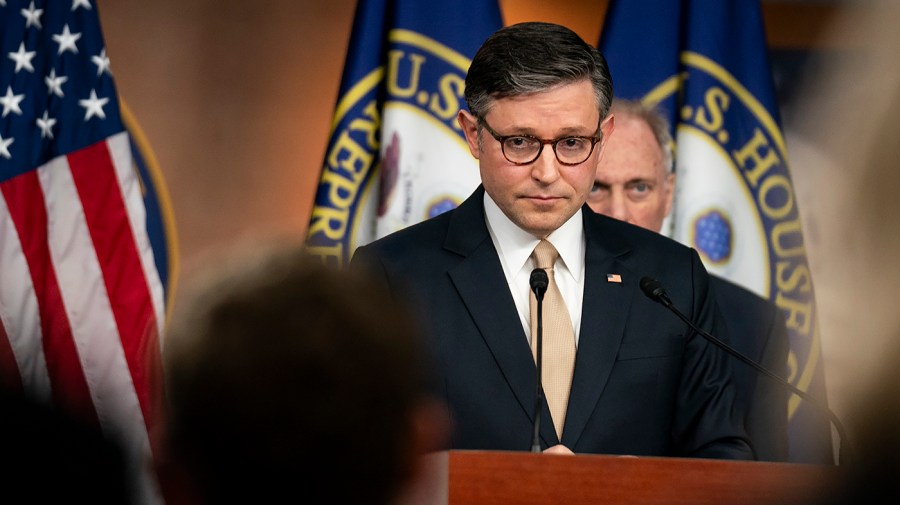
Speaker Mike Johnson (R-La.) is looking to lock down the votes to pass his stopgap funding bill and avert a government shutdown by Friday’s deadline, as he works to keep the lights on in Washington during the beginning weeks of President Trump’s second term.
Johnson unveiled a continuing resolution on Saturday that would keep the government funded until Sept. 30, the end of the fiscal year. The stopgap would boost defense funding and cut non-defense programs.
President Trump endorsed the measure shortly after its release, urging Republicans to “vote (Please!) YES” when it hits the floor. House Democratic leaders, meanwhile, slammed the measure as a “partisan” bill that “recklessly” cuts a number of benefits, announcing that they will vote against the bill.
With the majority of House Democrats likely to follow their leadership’s lead, Johnson will need near-unanimity to move the measure out of the lower chamber, a prospect that remains unclear as a number of hardline conservatives and moderates withhold their votes.
Also this week, House Democrats are scheduled to convene for their annual issues conference in Leesburg, Va., as the caucus struggles to coalesce around a cohesive strategy to combat Trump’s second administration. Across the Capitol, senators will vote on former Rep. Lori Chavez-DeRemer’s (R-Ore.) confirmation to be secretary of Labor.
Congress races to avert shutdown
Johnson is looking to clear his continuing resolution on Tuesday and send the measure to the Senate for consideration ahead of the Friday-at-midnight shutdown deadline. It remains unclear, however, if he will have the votes to move the measure out of his chamber.
If all Democrats oppose the measure and there is full attendance, Johnson can only afford to lose one Republican vote and still clear the bill. And some cracks are already emerging in the House GOP conference.
Rep. Thomas Massie (R-Ky.), who frequently bucks the party on fiscal matters, is likely to vote against the measure since it does not include a provision he championed in 2023 that would implement a one-percent cut on funding across the board. He also cast doubt on the idea of a stopgap last week.
Aside from Massie, a number of other hardline conservatives have withheld support from the bill. Rep. Tim Burchett (R-Tenn.), for example, told The Hill on Sunday that he was undecided on the measure.
Even some moderate Republicans stopped short of immediately backing the measure. Rep. Brian Fitzpatrick (R-Pa.) said on CBS’s “Face the Nation” on Sunday “like most bills, there’s some good in there, there’s some not so good in there,” noting that he had not yet taken a position on the legislation. Rep. Tony Gonzales (R-Texas), meanwhile, said on CNN’s “State of the Union” on Sunday he would make a “game-time decision” of whether or not to back the measure.
The apprehension among both corners of the House GOP conference is spelling trouble for Johnson, who will need to get his ducks in a row ahead of Tuesday’s expected vote and Friday’s shutdown deadline.
If the measure does, however, squeak through the House, its fate in the Senate remains unclear, with at least seven Democrats needed to join Republicans in supporting the measure to clear the 60-vote threshold and send the bill to Trump’s desk. Just one Democrat, Sen. John Fetterman (Pa.), has thus far signaled that they may support the measure.
Sen. Patty Murray (Wash.), the top Democrat on the Appropriations Committee, released a statement on Saturday slamming the measure as a “slush fund continuing resolution that would give Donald Trump and Elon Musk more power over federal spending,” signaling that she, and like others in leadership, would oppose the bill.
Even some Democrats who represent swing states are casting doubt on the measure. Sen. Elissa Slotkin (D) — who represents the state of Michigan, which Trump won in November — said she is still pushing for language in the measure that would ensure that the president properly directs money that is appropriated by Congress.
“The fundamental point, at least as I approach this, is that the president has been deciding how to spend the money anyway he wants even when we have a budget that both Democrats and Republicans voted on. That’s a constitutional issue, right?” Slotkin said on NBC’s “Meet the Press” on Sunday. “Everyone knows Congress has the power of the purse. So until I see some assurances that whatever we pass next week is going to ensure that the money is spent the way Congress intends, I’m going to withhold my vote until I see that.”
Senate to hold final vote on Chavez-DeRemer for Labor secretary
Chavez-DeRemer is expected to be confirmed as the next secretary of Labor Monday night, placing her atop the department following an unconventional nomination process.
The Senate is scheduled to vote at 5:30 p.m. on Monday.
Chavez-DeRemer’s likely confirmation comes days after the Senate advanced her nomination in a bipartisan 66-30 vote, tee-ing her up for a final vote.
Weeks ago, however, her confirmation did not look as sure.
Unlike other nominees, Chavez-DeRemer drew scrutiny from some Republicans for her support for the PRO Act, a measure supported by Democrats that would help strengthen the ability for unions to organize. Chavez-DeRemer co-sponsored the legislation when she served in the House.
That history prompted Sen. Rand Paul (R-Ky.) to vote against Chavez-DeRemer in the Senate Health, Education, Labor and Pensions Committee. Support from a trio of Democrats, however, helped dispatch her to the Senate floor.
House Democrats to hold issues conference
House Democrats are scheduled to gather in Leesburg, Va., for their annual issues conference this week, a retreat that comes as the party continues to search for a cohesive message — and apt messenger — to combat the second Trump administration.
The conference is scheduled to take place from March 12 through March 14.
It remains unclear, however, what will happen with the retreat if the House fails to pass a funding bill by Wednesday. With the shutdown deadline on Friday at midnight, the caucus’s plans could be thrown a curveball.
The agenda, meanwhile, is already taking shape. Kentucky Gov. Andy Beshear (D), Pennsylvania Gov. Josh Shapiro (D) and Michigan Gov. Gretchen Whitmer (D) are all scheduled to speak at the event, according to Politico.
In the first month and a half of the second Trump administration, Democrats on Capitol Hill worked — and at times failed — to find an effective way to message against the president’s actions. The caucus has largely slammed the GOP’s potential plans to slash Medicaid in their sweeping agenda bill and moves made by the Department of Government Efficiency (DOGE).
Those ideas, however, were largely drowned out last week, when protests at Trump’s address to a joint session of Congress dominated the conversation following the speech.
House Democratic Caucus Chair Pete Aguilar (Calif.) said the group this week will focus on addressing the cost of living and their path to winning back control of the lower chamber next year.
“While Republicans squander their majority by failing to address the cost of living crisis, House Democrats are United to Win and deliver real relief for the American people,” Aguilar said in a statement when the conference was announced earlier this year. “Now more than ever, families across the country are counting on us to rise above the partisan politics that have defined Republican control and find bipartisan solutions for their most pressing concerns. This year’s Issues Conference will underscore that commitment and help our Caucus chart the path to reclaiming the People’s House.”










